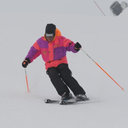Arctigenin induces the apoptosis of primary effusion lymphoma cells under conditions of glucose deprivation.
Schlüsselwörter
Abstrakt
Kaposi's sarcoma-associated herpesvirus (KSHV) is the causative agent of primary effusion lymphoma (PEL) and Kaposi's sarcoma. PEL is a type of non-Hodgkin's B-cell lymphoma, affecting immunosuppressed individuals, such as post-transplant or AIDS patients. However, since PEL is resistant to chemotherapeutic regimens, new effective treatment strategies are required. Arctigenin, a natural lignan compound found in the plant Arctium lappa, has been widely investigated as a potential anticancer agent in the clinical setting. In the present study, we examined the cytotoxic effects of arctigenin by cell viability assay and found that arctigenin markedly inhibited the proliferation of PEL cells compared with KSHV-uninfected B-lymphoma cells under conditions of glucose deprivation. Arctigenin decreased cellular ATP levels, disrupted mitochondrial membrane potential and triggered caspase-9-mediated apoptosis in the glucose-deprived PEL cells. In addition, western blot analysis using phospho-specific antibodies were used to evaluate activity changes in the signaling pathways of interest. As a result, arctigenin suppressed the activation of the extracellular signal-regulated kinase (ERK) and p38 mitogen-activated protein kinase (p38 MAPK) signaling pathways by inhibiting ERK and p38 MAPK phosphorylation in the glucose-deprived PEL cells. We confirmed that an inhibitor of ERK (U0126) or p38 MAPK (SB202190 and SB203580) suppressed the proliferation of the BC3 PEL cells compared with the KSHV-negative DG75 cells. Moreover, RT-PCR and luciferase reporter assay revealed that arctigenin and p38 MAPK inhibition by SB202190 or SB203580 downregulated the transcriptional expression of unfolded protein response (UPR)‑related molecules, including GRP78 and ATF6α under conditions of glucose deprivation. Finally, we confirmed that arctigenin did not affect KSHV replication in PEL cells, suggesting that arctigenin treatment for PEL does not contribute to the risk of de novo KSHV production. These data thus indicate that arctigenin may serve as a lead compound for the development of novel and effective drugs for the treatment of PEL.


